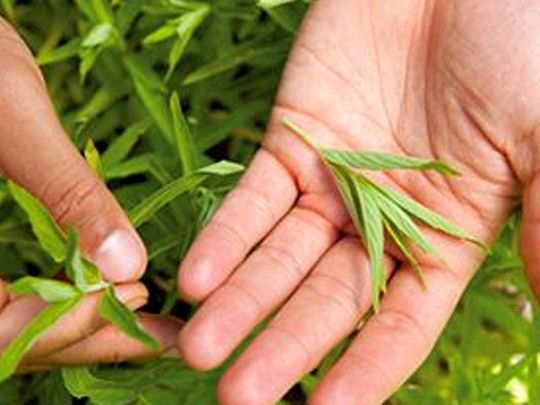
Abu Dhabi: A herbal-based formula extracted from endangered plants across the UAE is set to undergo clinical tests for its efficacy to help combat serious diseases such as diabetes, a health expert said during a symposium on protection of medicinal plants in thecountry.
A designated farm to help preserve the medicinal plants at the Zayed Complex for Herbal Research and Traditional Medicine in Abu Dhabi has been recently recognised by the World Health Organisation (WHO) as a regional centre for herbal research.
"Through evidence based research we plan to introduce our own herbal-based formula, and will continue into clinical trials by offering patients herbal solutions for different chronic diseases such as allergies, asthma, kidney stones, hyper tension and diabetes. A single herb can have 1,000 active ingredients, which can be useful to help combat all these diseases put together," Dr. Mazen Ali Naji, Manager at the Zayed Complex for Herbal Research and Traditional Medicine told Gulf News on the sidelines of Wednesday's meeting.
Preservation
In line with Shaikh Zayed Bin Sultan Al Nahyan's vision to preserve medicinal plants, the Ministry of Environment and Water (MOEW) partnered with the Health Authority Abu Dhabi in a project to help preserve 30 different kinds of plants in the UAE, known for their useful medical components.
"There are 640 different types of plants in rural areas and deserts across the UAE, 30 per cent of which are herbal. Most of these herbal plants are prone to habitat destruction due to changing weather conditions and animal feed, that's why we are supporting projects which help preserve these endangered plants," said Eng Ahmad Al Matri, Director, Desertification Combat Dept at the MOEW.
Tips to handling toxic plants
Seven ways to avoid plant poisoning (Source: Zayed Complex for Herbal Research and Traditional Medicine)
1. Become familiar with the dangerous plants in your garden and home.
2. Don't eat wild plants, unless you are sure their safe.
3. Keep plants, seeds and fruits away from children.
4. Choose safe plants for decorating your home.
5. Avoid smoke from burning plants.
6. Don't make homemade medicines from collected wild plants or cultivated plants.
7. As leaves of house plants die and fall off, dispose them.
Emergency management for plant related poisoning:
Exposure to mouth: remove any plant parts from the victims mouth. Give a small amount of water.
Exposure to skin: Wash exposed skin with cold water immediately. Remove any clothing that had been in contact with the plant.
Exposure to eyes: Rinse eyes with warm water for 15 minutes.
Go to your doctor or a health care facility right away, don't wait for symptoms to develop.













